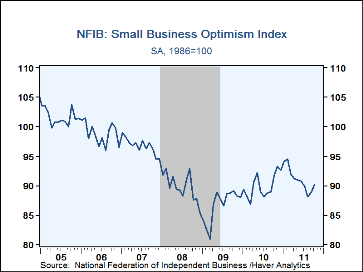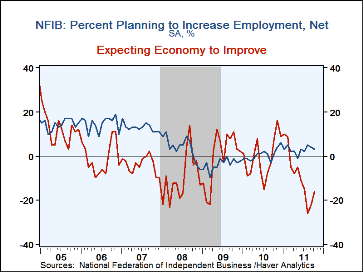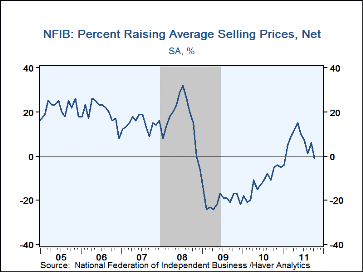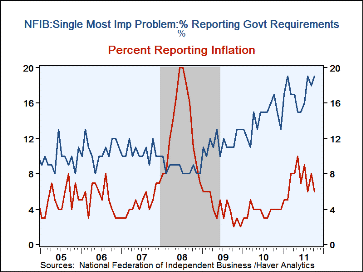 Global| Nov 08 2011
Global| Nov 08 2011U.S. Small Business Optimism Improves
by:Tom Moeller
|in:Economy in Brief
Summary
The National Federation of Independent Business indicated that its October index of small business optimism rose to 90.2 from an unrevised 88.9 in September. Improvement in firms' expectations for the economy and sales was accompanied [...]
The National Federation of Independent Business indicated that its October index of small business optimism rose to 90.2 from an unrevised 88.9 in September. Improvement in firms' expectations for the economy and sales was accompanied by a stable jobs reading. Also, the percentage of firms making capital expenditures rose back to its highest level of the recovery. Moreover, the percentage of firms indicating that now is a good time to expand was its highest since February. The percentage of firms raising prices reversed course and fell to -1%, its lowest level since January. The percentage of firms planning to raise prices remained at 14%, its lowest since November.
The most important problems faced by small business were poor sales (26%), government requirements (19%), taxes (18%), inflation (6%), insurance cost & availability (7%), competition from large businesses (6%), quality of labor (6%), financial & interest rates (4%) and the cost of labor (4%).
Roughly 24 million small businesses exist in the U.S. and they create 80% of all new jobs. The NFIB figures can be found in Haver's SURVEYS database.
| National Federation of Independent Business | Oct | Sep | Aug | Oct'10 | 2010 | 2009 | 2008 |
|---|---|---|---|---|---|---|---|
| Small Business Optimism Index (SA,1986=100) | 90.2 | 88.9 | 88.1 | 91.7 | 89.9 | 86.7 | 89.8 |
| Firms Expecting Higher Real Sales In Six Months (Net %) | -4 | -6 | -12 | 1 | 1 | -11 | -7 |
| Firms Expecting Economy To Improve (Net %) | -16 | -22 | -26 | 18 | -1 | -0 | -10 |
| Firms With One or More Job Openings (Net %) | 14 | 14 | 15 | 10 | 10 | 9 | 18 |
| Firms Reporting That Credit Was Harder To Get (Net %) | 11 | 10 | 13 | 11 | 13 | 14 | 9 |
| Firms Raising Avg. Selling Prices (Net %) | -1 | 6 | 1 | -5 | -12 | -20 | 17 |
Tom Moeller
AuthorMore in Author Profile »Prior to joining Haver Analytics in 2000, Mr. Moeller worked as the Economist at Chancellor Capital Management from 1985 to 1999. There, he developed comprehensive economic forecasts and interpreted economic data for equity and fixed income portfolio managers. Also at Chancellor, Mr. Moeller worked as an equity analyst and was responsible for researching and rating companies in the economically sensitive automobile and housing industries for investment in Chancellor’s equity portfolio. Prior to joining Chancellor, Mr. Moeller was an Economist at Citibank from 1979 to 1984. He also analyzed pricing behavior in the metals industry for the Council on Wage and Price Stability in Washington, D.C. In 1999, Mr. Moeller received the award for most accurate forecast from the Forecasters' Club of New York. From 1990 to 1992 he was President of the New York Association for Business Economists. Mr. Moeller earned an M.B.A. in Finance from Fordham University, where he graduated in 1987. He holds a Bachelor of Arts in Economics from George Washington University.










